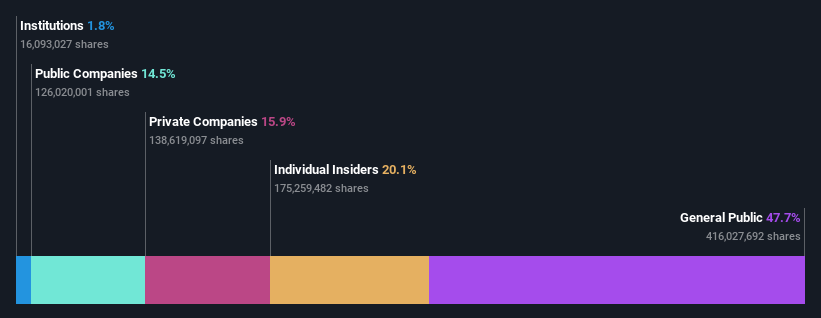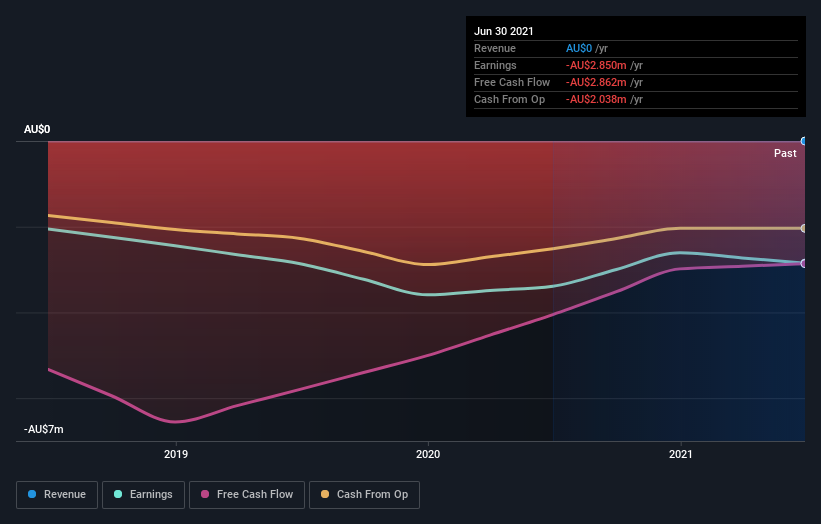Here's What Black Rock Mining Limited's (ASX:BKT) Shareholder Ownership Structure Looks Like
Every investor in Black Rock Mining Limited (ASX:BKT) should be aware of the most powerful shareholder groups. Institutions often own shares in more established companies, while it's not unusual to see insiders own a fair bit of smaller companies. I quite like to see at least a little bit of insider ownership. As Charlie Munger said 'Show me the incentive and I will show you the outcome.
With a market capitalization of AU$196m, Black Rock Mining is a small cap stock, so it might not be well known by many institutional investors. In the chart below, we can see that institutions are not really that prevalent on the share registry. Let's delve deeper into each type of owner, to discover more about Black Rock Mining.
View our latest analysis for Black Rock Mining
What Does The Institutional Ownership Tell Us About Black Rock Mining?
Institutional investors commonly compare their own returns to the returns of a commonly followed index. So they generally do consider buying larger companies that are included in the relevant benchmark index.
Institutions have a very small stake in Black Rock Mining. That indicates that the company is on the radar of some funds, but it isn't particularly popular with professional investors at the moment. If the business gets stronger from here, we could see a situation where more institutions are keen to buy. It is not uncommon to see a big share price rise if multiple institutional investors are trying to buy into a stock at the same time. So check out the historic earnings trajectory, below, but keep in mind it's the future that counts most.
We note that hedge funds don't have a meaningful investment in Black Rock Mining. POSCO Holdings Inc. is currently the company's largest shareholder with 14% of shares outstanding. Meanwhile, the second and third largest shareholders, hold 9.2% and 7.6%, of the shares outstanding, respectively. Additionally, the company's CEO John de Vries directly holds 1.2% of the total shares outstanding.
Looking at the shareholder registry, we can see that 51% of the ownership is controlled by the top 18 shareholders, meaning that no single shareholder has a majority interest in the ownership.
Researching institutional ownership is a good way to gauge and filter a stock's expected performance. The same can be achieved by studying analyst sentiments. Our information suggests that there isn't any analyst coverage of the stock, so it is probably little known.
Insider Ownership Of Black Rock Mining
While the precise definition of an insider can be subjective, almost everyone considers board members to be insiders. Management ultimately answers to the board. However, it is not uncommon for managers to be executive board members, especially if they are a founder or the CEO.
I generally consider insider ownership to be a good thing. However, on some occasions it makes it more difficult for other shareholders to hold the board accountable for decisions.
It seems insiders own a significant proportion of Black Rock Mining Limited. Insiders own AU$39m worth of shares in the AU$196m company. We would say this shows alignment with shareholders, but it is worth noting that the company is still quite small; some insiders may have founded the business. You can click here to see if those insiders have been buying or selling.
General Public Ownership
With a 48% ownership, the general public, mostly comprising of individual investors, have some degree of sway over Black Rock Mining. While this group can't necessarily call the shots, it can certainly have a real influence on how the company is run.
Private Company Ownership
Our data indicates that Private Companies hold 16%, of the company's shares. Private companies may be related parties. Sometimes insiders have an interest in a public company through a holding in a private company, rather than in their own capacity as an individual. While it's hard to draw any broad stroke conclusions, it is worth noting as an area for further research.
Public Company Ownership
It appears to us that public companies own 14% of Black Rock Mining. We can't be certain but it is quite possible this is a strategic stake. The businesses may be similar, or work together.
Next Steps:
It's always worth thinking about the different groups who own shares in a company. But to understand Black Rock Mining better, we need to consider many other factors. Like risks, for instance. Every company has them, and we've spotted 3 warning signs for Black Rock Mining (of which 2 are a bit concerning!) you should know about.
Of course, you might find a fantastic investment by looking elsewhere. So take a peek at this free list of interesting companies.
NB: Figures in this article are calculated using data from the last twelve months, which refer to the 12-month period ending on the last date of the month the financial statement is dated. This may not be consistent with full year annual report figures.
Have feedback on this article? Concerned about the content? Get in touch with us directly. Alternatively, email editorial-team (at) simplywallst.com.
This article by Simply Wall St is general in nature. We provide commentary based on historical data and analyst forecasts only using an unbiased methodology and our articles are not intended to be financial advice. It does not constitute a recommendation to buy or sell any stock, and does not take account of your objectives, or your financial situation. We aim to bring you long-term focused analysis driven by fundamental data. Note that our analysis may not factor in the latest price-sensitive company announcements or qualitative material. Simply Wall St has no position in any stocks mentioned.

 Yahoo Finance
Yahoo Finance 

